Let’s be honest—most of us weren’t taught how to manage money in a way that feels doable or empowering.
We were taught to aim for perfection instead of progress. We’re told to “budget better,” “just save more,” or “invest early”—with no real help, no safety net, and no room for our lived realities.
I’ve met Canadians who have university degrees and still live paycheque to paycheque. I’ve worked with people juggling multiple jobs, single parents trying to stay afloat, and newcomers trying to make sense of a completely different financial system.
This isn’t a personal failure.
It’s a systems issue—and it’s why financial empowerment needs to be about more than buzzwords or judgment. It’s about giving people access to clear, practical tools, support that respects their situation, and education that doesn’t assume you already have it all together.
In this article, I’m sharing how programs like Prosper Canada’s Making the Most of Your Money and community initiatives across the country are giving Canadians a better shot—not by preaching perfection, but by helping us build skills, strategies, and confidence that work in real life.
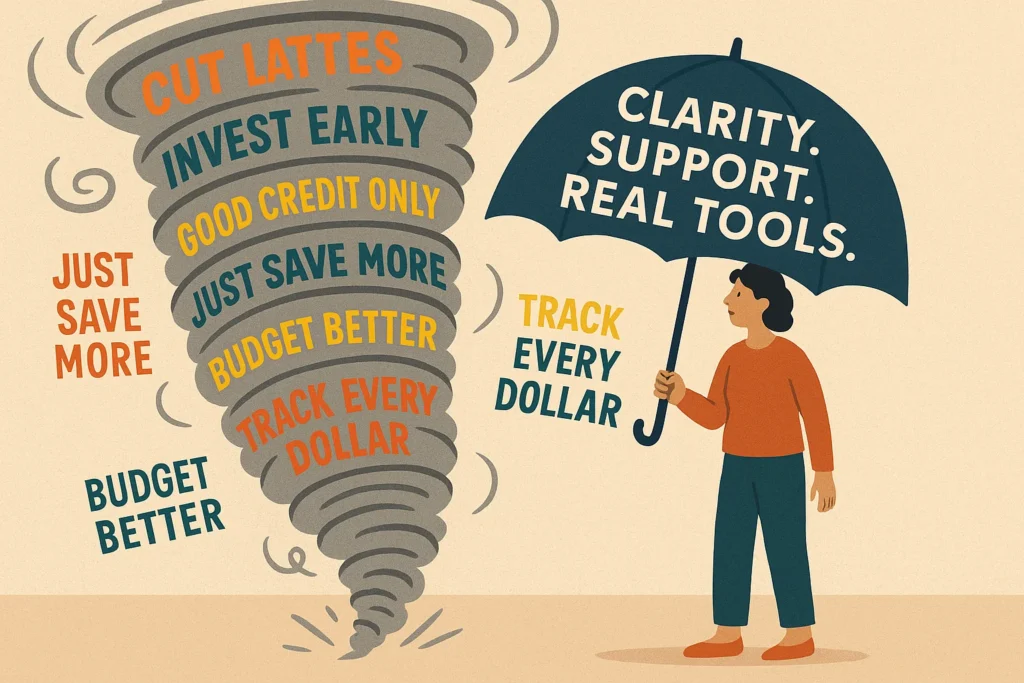
🧾Budgeting Isn’t Just for Planners—It’s for Survival
Let’s clear something up: budgeting isn’t about spreadsheets and discipline—it’s about staying in control when everything else feels uncertain.
A lot of the people I work with aren’t new to money stress. They’re navigating income that changes month to month. They’re deciding between groceries and phone bills. And when your income barely covers your basic needs, the idea of “budgeting” can feel frustrating or even insulting.
But when budgeting is taught in a way that respects real life, it becomes less about restriction and more about reclaiming your power.
Programs like those offered by the Toronto Public Library’s Financial Empowerment initiative—developed with support from Prosper Canada—meet people where they’re at. These aren’t lectures about cutting out lattes. They’re workshops and resources designed for people dealing with financial instability. They help you:
- Set financial goals you actually care about (not ones you think you “should” have)
- Learn how taxes and benefits work so you can maximize what’s available
- Build a plan for your take-home pay, even if it’s not a lot
This kind of budgeting support is essential—especially when you’re dealing with barriers like a lack of access to financial services, language challenges, or inconsistent income. And the best part? These programs aren’t just theory. They’re full of real tools, community support, and clear steps that make the next move feel possible.
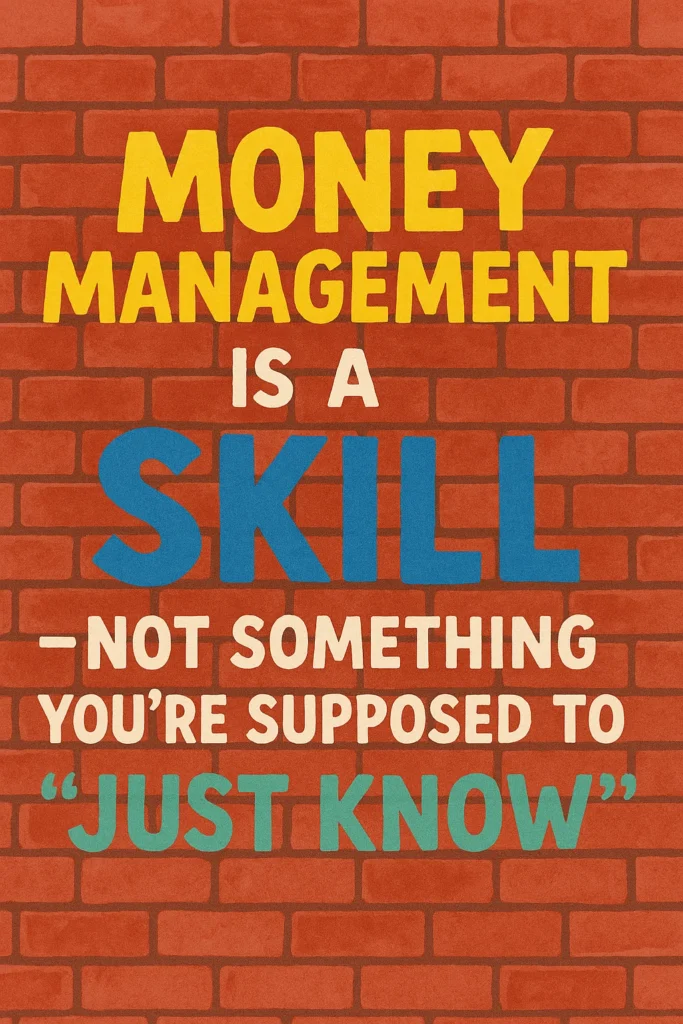
💡 Money Management Is a Skill—Not Something You’re Supposed to “Just Know”
Most people aren’t bad with money—they were just never given the chance to learn how to manage it in a way that fits their life.
The idea that you should “just know how to budget” or “use credit wisely” is a myth that keeps people stuck in shame. Managing your money well is a skill, and like any skill, it gets better with practice, support, and the right tools.
That’s why I appreciate programs that focus on practical money management strategies—not from a place of judgment, but from the understanding that everyone starts somewhere.
Organizations like North York Community House have been supporting newcomers, low-income earners, and families by offering hands-on budgeting and debt help. Their approach is simple, direct, and empathetic. No jargon, no lectures—just real strategies that help people:
- Understand how income actually flows (especially after taxes and deductions)
- Create budgets that change with their circumstances
- Learn how to use credit intentionally—not avoid it out of fear or misuse it out of stress
- Know which debts to tackle first and which can wait
- Set up small, consistent savings—even if it’s just $5 or $10 a week
As someone who’s worked with people from all walks of life, I can tell you: these are the basics that make the difference. They’re not glamorous, but they’re powerful. They build a foundation of confidence—and that’s where real financial empowerment begins.
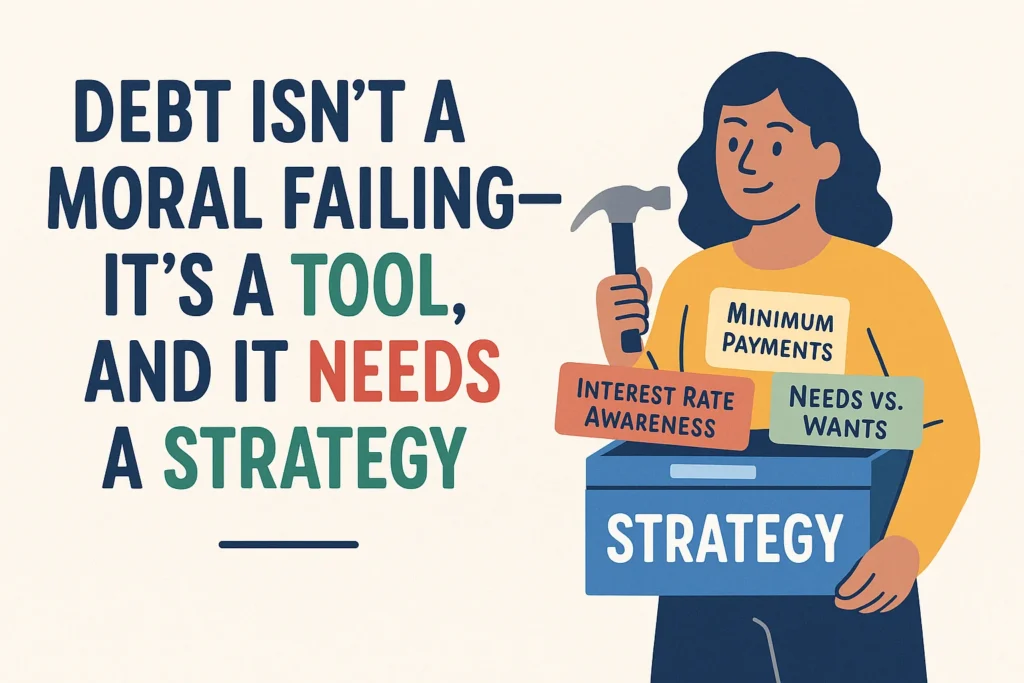
🧭 Debt Isn’t a Moral Failing—It’s a Tool, and It Needs a Strategy
Here’s something I say often: debt isn’t the problem—shame is.
So many Canadians carry debt, and yet most of us feel like we’re the only ones doing it wrong. We’re told to “just stop spending” or “pay it off faster” as if that’s easy or realistic when you’re already stretched thin.
But here’s the truth: debt can be a helpful tool, and like any tool, it needs a clear purpose and smart handling—not fear and judgment.
Responsible debt use starts with understanding the difference between needs and wants (which can shift over time), and not using credit to survive when what you really need is systemic support. That’s why financial education programs that talk openly about debt—without shaming people—are so important.
Some key strategies I share with clients include:
- Start with high-interest debt like payday loans or store cards. These cost the most over time.
- Use credit only for planned needs—not emotional decisions, especially during stress.
- Set realistic payments. Even small consistent payments are better than avoiding it altogether.
- Know your rights. Understand minimum payments, interest rates, and your credit score—and that you don’t have to be perfect to build credit.
You don’t have to be debt-free to be financially empowered. You just need a plan, some breathing room, and support that makes you feel capable—not condemned.
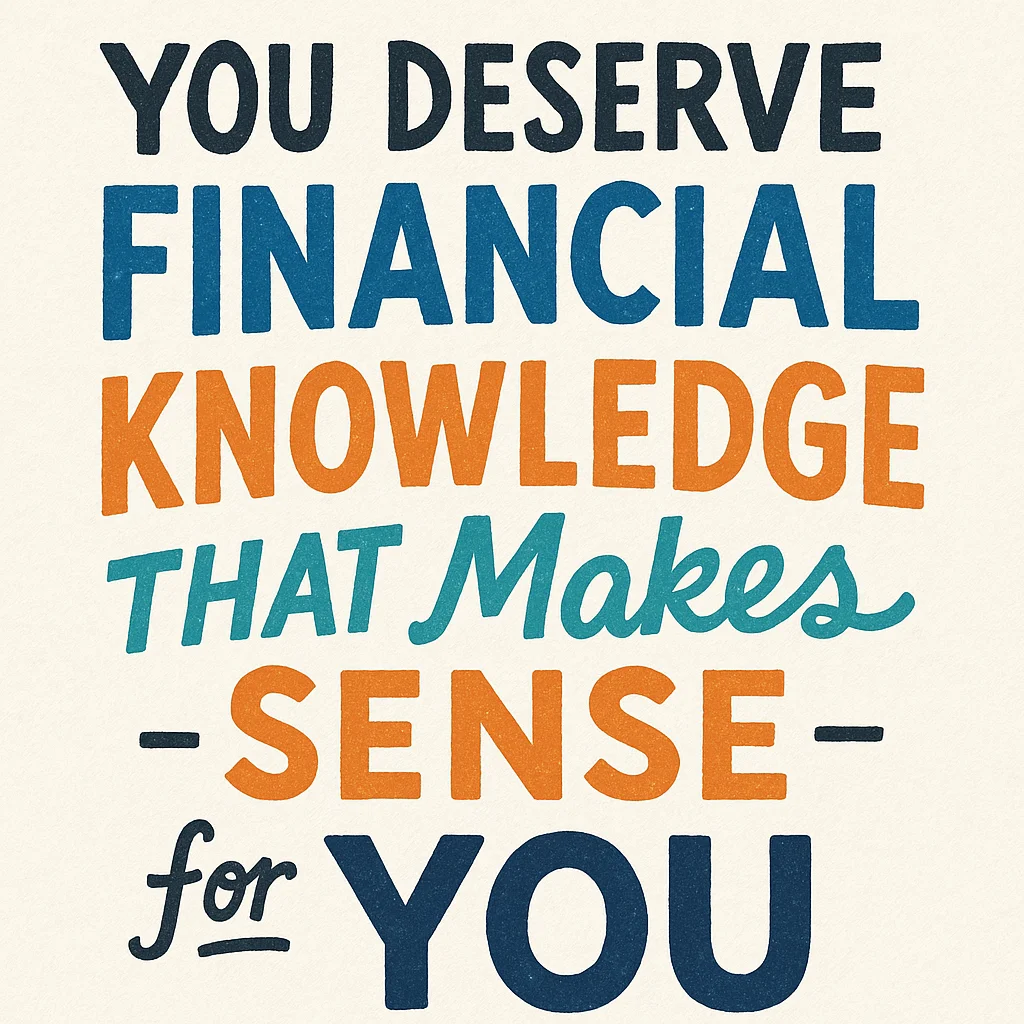
📚 You Deserve Financial Knowledge That Makes Sense—for You
Financial literacy shouldn’t be something only “finance people” understand. And it shouldn’t come with shame or assumptions that you already know the basics.
You deserve to understand how money works—without jargon, pressure, or judgment.
That’s why I often recommend tools and programs created with real-life people in mind, not just financial experts. One example is the work done by Prosper Canada, a national nonprofit that focuses on helping Canadians build financial security through simple, accessible education.
They offer resources that can actually fit into your life, like:
- ✅ Self-paced online courses – So you can learn about budgeting, credit, or taxes on your schedule
- ✅ Free one-on-one financial coaching – For personalized support that respects your unique challenges
- ✅ Budgeting tools – That help you track where your money’s going without needing a spreadsheet wizard
- ✅ Webinars and workshops – Where you can ask questions and learn with others
- ✅ Articles, videos, and resource hubs – All designed to be understandable and judgment-free
One thing I love? These tools are created with empathy. They assume you may be starting from scratch—or from survival mode—and they meet you there.
Knowledge isn’t just power—it’s peace of mind.
It gives you the clarity to make decisions, the language to ask questions, and the confidence to take that next small step forward.
You don’t have to figure it all out at once. But having resources that are built for your reality—not for some “ideal” budgeter—is where the shift begins.
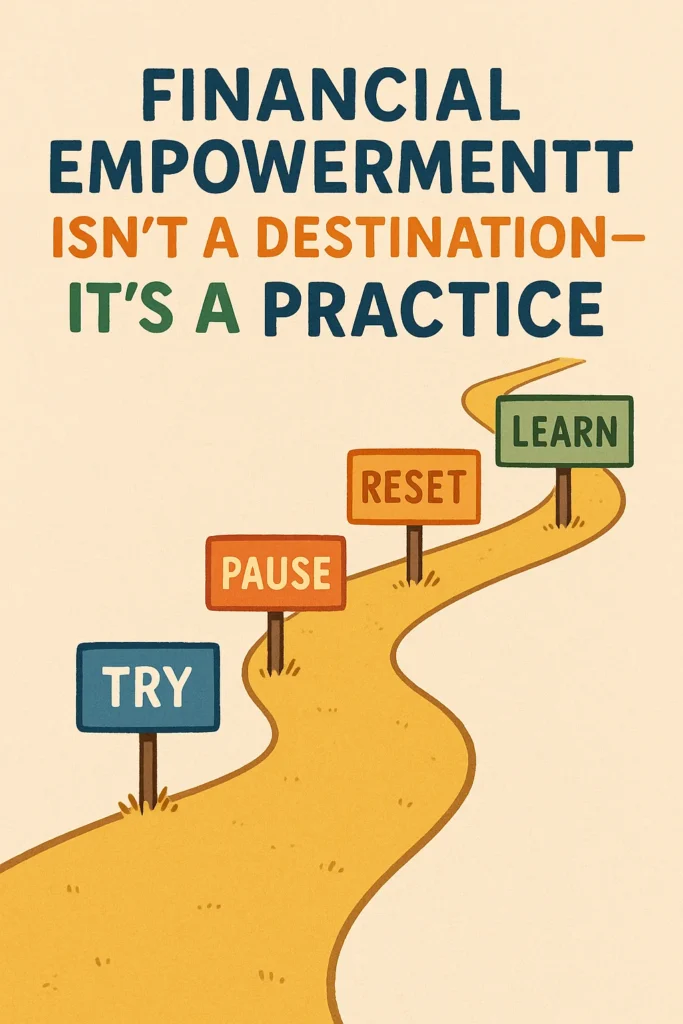
🔚 Financial Empowerment Isn’t a Destination—It’s a Practice
You don’t need a perfect plan.
You don’t need to have it all figured out.
You just need to believe that your financial story isn’t over—and that you’re allowed to write a better next chapter.
Financial empowerment isn’t about hitting a magic number or never using credit again. It’s about understanding your options, building habits that reflect your values, and knowing where to turn when you feel stuck.
Organizations like Prosper Canada, local libraries, and community financial coaches aren’t just offering tools. They’re offering a shift in mindset—from shame to strategy, from surviving to stabilizing, and eventually, to thriving.
Whether you’re trying to:
- Stretch your paycheque a bit further
- Rebuild after burnout or debt
- Learn how to actually save on a low income
- Or just stop feeling like you’re constantly behind…
There’s help. There’s hope. And there’s a version of financial stability that’s realistic for you—not based on someone else’s life or income.
Financial empowerment isn’t a one-time fix.
It’s something we practice, one small, honest step at a time.
You’re not failing.
You’re learning, building, and reclaiming what was always yours to begin with:
A sense of control, peace, and possibility.
🧰 What You Can Do Next: A Mini Toolkit
If you’re ready to take the first—or next—step, here are a few simple actions to help you move forward:
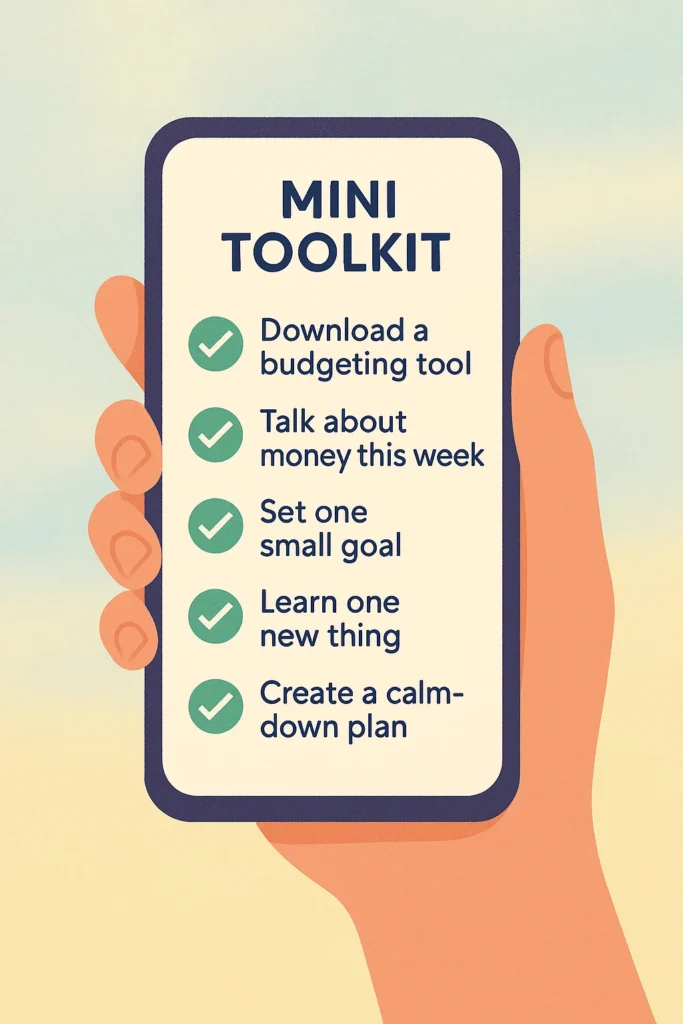
🛠️ Build your “calm down plan” for financial stress
Create a list of steps you can take when you feel overwhelmed—breathing, reaching out, looking at one number at a time. Keep it somewhere visible.
✅ Download a free budgeting tool
Check out Prosper Canada’s Tools to start tracking your spending in a way that feels doable, not overwhelming.
💬 Talk to someone about money this week
A friend, a coach, a librarian, or someone at a community agency. You don’t have to ask for advice—just talk.
✍️ Set a micro-goal
Choose one thing to work on this month, like “track what I spend on food” or “check my credit report.” Small goals build confidence.
📚 Learn one new thing about money
Watch a short video. Read a blog post. Attend a local workshop. One new insight can shift your entire perspective.
🌀 What to Do When You Feel Overwhelmed
Money stress isn’t just frustrating—it can be paralyzing.
You know you need to check your bank balance or figure out how to cover rent, but your brain says, “Nope. Too much.” That freezing, spiraling, sick-to-your-stomach feeling? It’s real. And it’s valid.
When you’re overwhelmed, the best thing you can do is ground yourself and shrink the problem into something manageable. Here are a few tools I recommend to clients when the anxiety feels bigger than the bank account:
- Use a grounding phrase like:
“I don’t need to solve everything today. I just need to take the next small step.”
Say it out loud. Post it somewhere. Let it anchor you. - Breathe before checking your accounts.
One deep breath in. One out. Then look. Then close the app. Then decide what comes next. This trains your nervous system not to associate money with panic. - Write down what’s true—not just what you fear.
Instead of “I’m terrible with money,” try:
“I paid my rent this month.”
“I remembered to check my account.”
“I’m reading this article and trying to learn.”
That’s progress. - Talk to someone safe.
Not everyone has someone in their life who “gets it.” But whether it’s a friend, a financial coach, a hotline, or a support worker, you’re not meant to carry money stress alone.
Money overwhelm isn’t a personal failure. It’s a signal. You deserve care, clarity, and support—not shame.
💬 Your Next Step Starts Now
Financial empowerment doesn’t happen all at once—and it doesn’t have to happen alone.
You don’t need to be perfect. You don’t need to be ready for every step. You just need to be open to the next one.
Whether you’re downloading a tool, having a conversation, or simply noticing your own mindset shift—that’s real progress.
👉 If this article spoke to you, I’d love to hear what your next small step looks like.
Leave a comment, share a takeaway, or message me if you want to keep the conversation going.
Together, we can build something better—one small, steady step at a time.
#FinancialEmpowerment #MoneyWithoutShame #EveryDollarCounts #ProsperCanada
